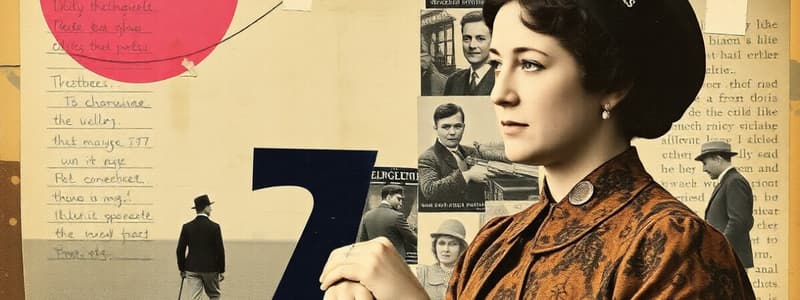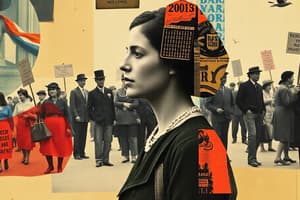Podcast
Questions and Answers
What did Abby accuse northern states of being similar to?
What did Abby accuse northern states of being similar to?
- Ignorant citizens
- Slaveholders (correct)
- British colonizers
- Hypocritical leaders
Abby Foster was a strong advocate for women's rights while being against slavery.
Abby Foster was a strong advocate for women's rights while being against slavery.
True (A)
What phrase did Abby use to protest against taxes imposed without representation?
What phrase did Abby use to protest against taxes imposed without representation?
taxation without representation
Abby Foster and her husband refused to pay real estate taxes on their home because they believed the government was made up entirely of _____ .
Abby Foster and her husband refused to pay real estate taxes on their home because they believed the government was made up entirely of _____ .
Match the suffragist with their known activity or characteristic:
Match the suffragist with their known activity or characteristic:
What was one method that suffragists used to spread their message?
What was one method that suffragists used to spread their message?
The first auction of the Fosters' property was successful in helping them keep their home.
The first auction of the Fosters' property was successful in helping them keep their home.
What did Abby remind the suffragists about their predecessors?
What did Abby remind the suffragists about their predecessors?
What was Abby Kelley Foster's primary cause that she passionately supported?
What was Abby Kelley Foster's primary cause that she passionately supported?
Abby Kelley Foster was welcomed by every church congregation she visited.
Abby Kelley Foster was welcomed by every church congregation she visited.
In which state did Abby Kelley first work as a teacher?
In which state did Abby Kelley first work as a teacher?
Abby Kelley was born into a middle-class _______ family.
Abby Kelley was born into a middle-class _______ family.
How did the preacher react upon seeing Abby Kelley at church?
How did the preacher react upon seeing Abby Kelley at church?
What did Abby Kelley do when she was refused entry to churches?
What did Abby Kelley do when she was refused entry to churches?
Match the following events with their descriptions:
Match the following events with their descriptions:
Abby was known for her _______ and independent spirit in her speeches.
Abby was known for her _______ and independent spirit in her speeches.
Flashcards
Who was Abby Kelley Foster compared to?
Who was Abby Kelley Foster compared to?
Abby Kelley Foster was criticized by a preacher in Connecticut, comparing her to a biblical villain named Jezebel.
Why was Abby Kelley Foster ostracized?
Why was Abby Kelley Foster ostracized?
Abby Kelley Foster's outspoken stance against slavery made her unpopular, resulting in her being excluded from public spaces like churches and town halls.
How impactful were Abby Kelley Foster's speeches?
How impactful were Abby Kelley Foster's speeches?
Abby Kelley Foster was a persuasive speaker whose speeches were so impactful that someone warned her that God might punish her for speaking.
What did Abby Kelley Foster's public speaking challenge?
What did Abby Kelley Foster's public speaking challenge?
Signup and view all the flashcards
How did Abby Kelley Foster and Lucretia Mott face the mob?
How did Abby Kelley Foster and Lucretia Mott face the mob?
Signup and view all the flashcards
What happened to the lecture hall after Abby Kelly Foster and others spoke?
What happened to the lecture hall after Abby Kelly Foster and others spoke?
Signup and view all the flashcards
What were Abby Kelley Foster's views on slavery?
What were Abby Kelley Foster's views on slavery?
Signup and view all the flashcards
What does Abby Kelley Foster's story teach us?
What does Abby Kelley Foster's story teach us?
Signup and view all the flashcards
Who was Abby Kelley Foster?
Who was Abby Kelley Foster?
Signup and view all the flashcards
What was Abby Kelley Foster's key belief?
What was Abby Kelley Foster's key belief?
Signup and view all the flashcards
How was Abby Kelley Foster viewed by others?
How was Abby Kelley Foster viewed by others?
Signup and view all the flashcards
How did Abby Kelley Foster protest 'taxation without representation'?
How did Abby Kelley Foster protest 'taxation without representation'?
Signup and view all the flashcards
What tactics did Abby Kelley Foster employ in her fight for women's rights?
What tactics did Abby Kelley Foster employ in her fight for women's rights?
Signup and view all the flashcards
What other cause did Abby Kelley Foster champion?
What other cause did Abby Kelley Foster champion?
Signup and view all the flashcards
What was Abby Kelley Foster's role in the women's suffrage movement?
What was Abby Kelley Foster's role in the women's suffrage movement?
Signup and view all the flashcards
What was Abby Kelley Foster's view on the history of women's rights?
What was Abby Kelley Foster's view on the history of women's rights?
Signup and view all the flashcards
Study Notes
Abby Kelley Foster - A Pioneer Suffragist
- Born January 15, 1811 – January 14, 1887
- Early life: A Quaker from Massachusetts, educated as a teacher
- Opposition to slavery: Abby became an outspoken abolitionist influenced by William Lloyd Garrison's lectures. She actively spoke against slavery, holding meetings outdoors, despite criticism and challenges.
- Public speaking: A powerful and persuasive public speaker, often criticised for her outspoken views. Audiences, particularly white men, were not used to women speaking publicly, even on important social issues
- Mob violence: Abby and other speakers faced physical threats and violence, like being pelted with rotten fruit and stones, for protesting slavery and women's rights.
- Advocacy for equal rights: Abby advocated for African American rights and for granting full civil rights to African Americans.
- Teaching position in Lynn, Massachusetts: This is where she encountered the teachings of William Lloyd Garrison and became deeply involved in the abolitionist movement.
- Public lecture halls: Abby and other antislavery speakers were often met with hostility. She and other speakers held meetings outside and in public places as a result. In 1838, a Philadelphia mob attacked an antislavery meeting Abby was involved in.
- Refusal of entrance to public places: She and other female speakers were often denied access to churches and town halls for speaking against slavery.
- Building Burning: An angry mob burned down a lecture hall where Abby spoke.
- 1843 Seneca Falls Convention: Abby was a figure before the convention, who led antislavery meetings there five years prior in 1843. This shows her early leadership in women's rights.
- Opposition to taxation without representation: In 1873, she and her husband protested taxation without representation by refusing to pay property taxes, sparking a seven-year legal battle in Massachusetts. This is a significant example of her challenging authority to protest inequality.
Suffrage Movement
- Public speaking as a key strategy: Women used speaking tours, lectures, and meeting attendance to spread their message. Lyceums and other organizations supported speakers, although payment was sometimes a problem.
- Historical context: Public speaking for women, especially for women of color, was not common in early 19th century US society. This makes Abby's dedication and actions even more significant.
- Organizations crucial for supporting the movement: Speaker's bureaus, called Lyceums, were organizations that played a vital role in supporting speakers by paying them, and helping to spread the messages of the suffrage movement. Organizations and individuals like Angelina and Sarah Grimké played essential roles as well.
- Early Suffragists: Women like Abby, Angelina, and Sarah Grimké, and Lucretia Mott were pioneers in pushing for equal rights and in challenging the status quo for women.
- Long-term Impact: Abby's actions and lessons paved the way for future suffragists, including Susan B. Anthony, inspiring future female speakers and activists to speak out against injustice. This, in turn, helped the suffragist movement move forward.
Studying That Suits You
Use AI to generate personalized quizzes and flashcards to suit your learning preferences.




